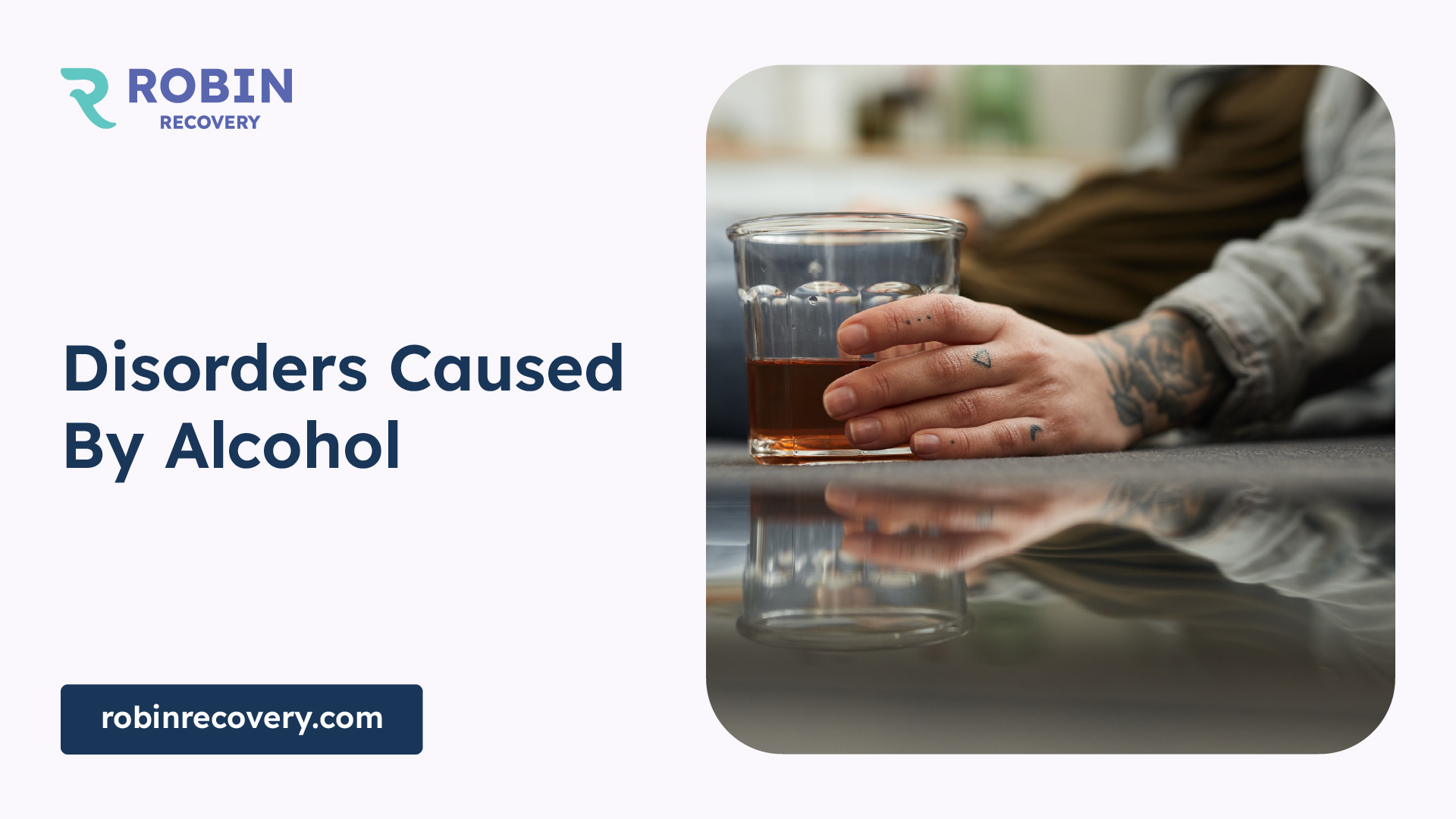Disorders Caused By Alcohol

Alcohol and Cardiovascular Health
One of the major areas impacted by alcohol consumption is the cardiovascular system. The effects of alcohol on this system can range from potentially beneficial to severely detrimental, depending on factors like the amount consumed and the frequency of consumption.
Impact of Alcohol on Cardiovascular System
Alcohol, particularly when consumed in heavy amounts, can cause significant damage to the cardiovascular system. However, moderate alcohol consumption has been associated with certain health benefits. This paradoxical relationship between alcohol and cardiovascular health can be complex and multifaceted [1].
For example, moderate alcohol consumption can increase the levels of high-density lipoproteins (HDL), also known as 'good cholesterol'. This is desirable for maintaining cardiovascular health, as HDL cholesterol helps remove other types of cholesterol from your bloodstream.

Additionally, studies have shown that alcohol can disrupt the function of NF-κB, a protein complex that controls transcription of DNA. This disruption leads to a reduction in the expression of adhesion molecules on the endothelial cell surface, ultimately decreasing the inflammatory process that contributes to atherosclerotic lesions.
On the other hand, heavy alcohol consumption can lead to various maladies. It's important to understand that these disorders caused by alcohol can be severe and potentially life-threatening.
Cardiovascular Disorders Caused by Alcohol
Chronic heavy alcohol consumption is associated with multiple cardiovascular disorders. These include dilated cardiomyopathy, a condition where the heart's ability to pump blood is decreased due to an enlarged and weakened left ventricle, and cardiac arrhythmias, which are irregular heart rhythms.
Other disorders include hypertension, also known as high blood pressure, and strokes. These conditions can lead to serious complications such as congestive heart failure, ventricular arrhythmias, increased blood pressure, and ischemic or hemorrhagic strokes.
The table below summarizes the potential cardiovascular disorders caused by heavy alcohol consumption:
In conclusion, while moderate alcohol consumption can have certain protective effects on the cardiovascular system, chronic heavy drinking can lead to a variety of serious disorders. It's crucial to understand these potential risks and to consume alcohol responsibly.
Neurological Effects of Alcohol
Alcohol consumption, particularly in large amounts, can have severe implications on the nervous system, leading to a range of neurological disorders. While some of these effects might be temporary, others can result in long-term damage, often irreversible. Understanding these disorders is crucial in emphasizing the detrimental impact of alcohol abuse.
Alcohol-Related Neurological Diseases
Large amounts of alcohol can result in alcohol-related neurological diseases. These conditions primarily affect the nervous system, leading to serious health problems. Furthermore, alcohol affects the levels of essential nutrients like thiamine, folate, and vitamin B6 & B12 in the body, leading to deficiency-associated complications.
Some common alcohol-related neurological disorders include:
- Alcoholic Neuropathy: This condition is characterized by peripheral nerve damage caused by long-term alcohol abuse. Symptomatically, it presents with weakness, numbness, tingling, and pain. The condition can worsen with deficiencies in B6, B12, thiamine, folate, niacin, and vitamin E.
- Alcohol Withdrawal Syndrome (AWS): Predominantly seen in individuals dependent on alcohol, AWS can range from mild to life-threatening. Common symptoms include tremors, anxiety, sweating, nausea, and insomnia.
- Fetal Alcohol Syndrome (FAS): FAS is a birth defect resulting from maternal alcohol consumption during pregnancy. It is a leading cause of mental retardation in the United States, causing physical and developmental issues in children.
Wernicke-Korsakoff Syndrome
Among the disorders caused by alcohol, Wernicke-Korsakoff Syndrome (WKS) is particularly severe. This neurologic disease results from chronic alcohol abuse and leads to significant brain damage and/or thiamine deficiency.
Symptoms of WKS include confusion, ataxia (a lack of muscle control during voluntary movements), decreased levels of consciousness, memory problems, and gait abnormalities. The syndrome is a combination of two conditions: Wernicke's encephalopathy and Korsakoff's psychosis. Both conditions typically occur together, where Wernicke's encephalopathy is often followed by Korsakoff's psychosis.
Managing these disorders often involves immediate medical intervention, including detoxification, rehabilitation, and long-term therapy. Understanding the potential neurological effects of alcohol is critical in the fight against alcohol abuse and its associated health consequences.
Alcohol Withdrawal and Neurological Complications
Alcohol withdrawal and the neurological complications that arise from it are pivotal aspects of the disorders caused by alcohol. These complications, including Alcohol Withdrawal Syndrome and Alcoholic Neuropathy, can have severe impacts on an individual's health and quality of life.
Alcohol Withdrawal Syndrome
Alcohol Withdrawal Syndrome (AWS) is a clinical manifestation that occurs when an individual who has developed tolerance and dependence on alcohol abruptly stops or substantially reduces their intake. Symptoms of AWS can range from mild to life-threatening, including distal hand tremor, anxiety, insomnia, and visual hallucinations. More severe manifestations can include psychomotor agitation, autonomic hyperactivity, seizures, or even coma [2].
Alcoholic Neuropathy
Alcoholic Neuropathy is a type of peripheral nerve damage caused by long-term alcohol abuse. This condition can be worsened by deficiencies in certain nutrients, including vitamins B6, B12, thiamine, folate, niacin, and vitamin E. Symptoms of alcoholic neuropathy include weakness, numbness, tingling, and pain.
It's crucial to understand that alcohol abuse doesn't just lead to temporary impairment or immediate health risks. The long-term neurological complications can be severe and life-altering. Awareness about these disorders caused by alcohol is a significant step towards prevention and early intervention.
Genetic Factors in Alcohol Use Disorder
Understanding the genetic factors at play in alcohol use disorders is a vital part of painting a complete picture of the disorders caused by alcohol. Research indicates that genetics play a significant role in an individual's susceptibility to developing alcoholism.
Role of Genetics in Alcoholism
Alcoholism, also known as alcohol dependence or alcohol use disorder, is a complex genetic disease. Genetics can account for approximately 45-65% of the liability to alcohol dependence, as suggested by adoption and twin studies.
Some of the genes known to affect the risk of alcoholism have been identified. This includes two genes involved in alcohol metabolism: ADH1B (alcohol dehydrogenase 1B) and ALDH2 (aldehyde dehydrogenase 2). Variations in these genes can affect an individual's risk for developing alcohol dependence, as well as their level of alcohol consumption and their risk for alcohol-associated diseases.
Additionally, variations in the GABRA2 gene, which regulates the GABAA receptor, have been linked to alcohol dependence. This association is strongest in individuals with early onset or comorbid drug dependence, and it has been replicated in multiple studies [3].
Epigenetics and Alcohol Use Disorder
Epigenetics refers to changes in gene expression that don't involve alterations to the underlying DNA sequence. The CHRM2 (muscarinic cholinergic receptor 2) gene has been associated with alcohol dependence, particularly in individuals with early onset or comorbid drug dependence. This association has also been replicated in multiple studies.
Understanding the role of genetics in alcoholism can help in the development of targeted treatment and prevention strategies. However, it's also important to remember that while genetics can increase the risk of alcoholism, they do not determine destiny. Environmental factors and personal choices also play a significant role in whether an individual develops an alcohol use disorder.
Alcohol-Associated Liver Diseases
A significant health concern related to alcohol abuse is the potential for liver disease. Alcohol-associated liver diseases are caused by heavy use of alcohol and are preventable. There are three types of alcohol-associated liver disease: steatotic (fatty) liver, alcohol-associated hepatitis, and cirrhosis.
Types of Alcohol-Associated Liver Diseases
- Steatotic (fatty) liver: This is the earliest stage of alcohol-associated liver disease and is characterized by an accumulation of fat in the liver cells. This condition can be reversible if the individual stops drinking alcohol.
- Alcohol-associated hepatitis: This condition is characterized by inflammation and damage to the liver cells, caused by excessive alcohol consumption. It can lead to symptoms like jaundice, abdominal pain, and nausea.
- Cirrhosis: This is the most severe form of alcohol-associated liver disease, characterized by scarring of the liver tissue. Cirrhosis can lead to serious complications like liver failure and is irreversible.
It's important to note that not everyone who consumes alcohol will develop liver disease. The reasons why some individuals develop these conditions while others do not are not fully understood. However, research is ongoing to explore possible genetic links to alcohol-associated liver disease.
Treatment and Management
The primary goal in treating alcohol-associated liver disease is to restore normal liver function. This may involve:
- Complete alcohol avoidance: The individual must stop drinking alcohol entirely to prevent further liver damage.
- Participation in alcohol use disorder treatment programs: These programs can provide the necessary support and resources to help the individual maintain abstinence from alcohol.
- Dietary changes: A balanced diet can help to improve liver health and manage symptoms.
- Medications: Certain medications can be used to manage symptoms and complications of alcohol-associated liver disease.
- Liver transplant: In severe cases, a liver transplant may be considered if the liver has been severely damaged.
Treatment for alcohol-associated liver disease should be personalized, taking into account the individual's overall health, the severity of the liver disease, and their willingness to maintain abstinence from alcohol. It's crucial to seek medical advice if you or someone you know is struggling with alcohol use and experiencing any symptoms of liver disease [4].
Health Consequences of Excessive Alcohol Consumption
Excessive alcohol consumption imparts a severe toll on an individual's health, leading to a multitude of disorders. The systemic effects of alcohol and its neurological manifestations are among the most disturbing consequences and are explored in detail in this section.
Systemic Effects of Alcohol
The systemic effects of alcohol can manifest in various ways in the body. A prime example is alcoholic liver disease, which can occur as a result of heavy drinking. This condition can lead to a multitude of troubling neurological manifestations, including hepatic encephalopathy (HE).
Another distressing consequence of excessive alcohol consumption is the development of alcohol withdrawal syndrome. This condition is the clinical manifestation of abruptly terminating or substantially reducing intake in patients who have developed tolerance and dependence. It can lead to severe symptoms ranging from distal hand tremor, anxiety, insomnia, and visual hallucinations to psychomotor agitation, autonomic hyperactivity, seizures, or coma.
Neurological Manifestations of Alcohol Abuse
Among the numerous disorders caused by alcohol, the neurological manifestations are particularly disturbing. Alcohol-related neurologic diseases can be caused by drinking large amounts of alcohol and affect the nervous system, leading to serious health problems. These conditions can impact thiamine, folate, and vitamin B6 & B-12 levels in the body, causing further complications [2].
Wernicke's encephalopathy (WE) and Korsakoff syndrome are classic neurological manifestations of excessive alcohol consumption. WE is caused by a thiamine deficiency and is characterized by a classic triad of oculomotor disturbance, ataxia, and confusion. Korsakoff syndrome is a chronic stage of WE and is characterized by memory impairment that is out of proportion to other cognitive functions.
Another severe neurologic disease resulting from chronic alcohol abuse is Wernicke-Korsakoff Syndrome (WKS). This condition leads to brain damage and/or thiamine deficiency, with symptoms such as confusion, ataxia, decreased levels of consciousness, memory problems, and gait abnormalities.
These systemic and neurological effects of alcohol abuse underline the need for prevention, early detection, and timely intervention in cases of excessive alcohol consumption. Awareness and understanding of these health consequences are the first steps towards addressing this global health issue.
References
[1]: https://www.ncbi.nlm.nih.gov/pmc/articles/PMC6826791/
[2]: https://premierneurologycenter.com/blog/neurologic-diseases-associated-with-alcohol-consumption/
[3]: https://www.ncbi.nlm.nih.gov/pmc/articles/PMC4056340/
[4]: https://www.hopkinsmedicine.org/health/conditions-and-diseases/alcoholinduced-liver-disease
[5]: https://www.elsevier.es/en-revista-gastroenterologia-hepatologia-english-edition--382-articulo-neurological-manifestations-excessive-alcohol-consumption-S2444382417301797
